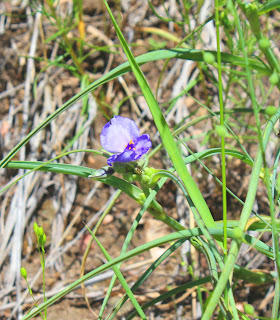Spiderwort Tradescantia virginiana
Leonard Atkins in his book Wildflowers of the Blue Ridge and Great Smokey Mountains writes that botanists studied the genetics of the spiderwort because it "appears to be a link between the simple Sedges and the more advanced Lilies. The hairs on the stamens are composed of thin-walled cells, enabling easy microscopic examinations of the cytoplasm and nucleus." But my appreciation stems more from a vist to Thomas Jefferson's gardens.
Monticello
On a rainy day in May, I attended a flower watercolor painting workshop at Monticello. After a demo, the instructor then told us to choose a flower and paint it.
I walked along the path which was bordered by mostly peonies.
My painting with the spiderwort at Monticello.
I chose the spiderwort because it was blooming nicely (as it does on most rainy days) and because it was a native flower (and thus I could count this as advanced instruction for Master Naturalist certification).
Anytime I do a drawing, I understand the plant better--especially how the leaves are alternate and clasp the stem and that that there are 3 petals with 6 bright yellow stamens.
Spiderwort, Hewlett Gulch, Colorado, June 14, 2016
Spiderworts grow in a variety of habitats including fields and roadsides. The above photo was taken in a meadow in Colorado, close to Fort Collins and Estes Park where we stayed.






These are a simple yet very pretty flower.
ReplyDeletea neighbor has purple spiderwort and orange daylilies around his mailbox - it's lovely all summer. Perhaps i need to find a wee spot i the garden to add one. love the color of yours.
ReplyDeleteglad you didn't pull up your spiderwort. your painting is really nice. good luck on your certification. hope all is well. have a great night~
ReplyDeleteWhat a beautiful flower!
ReplyDelete